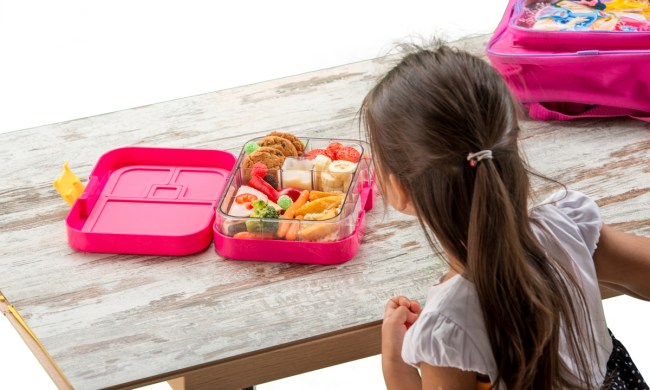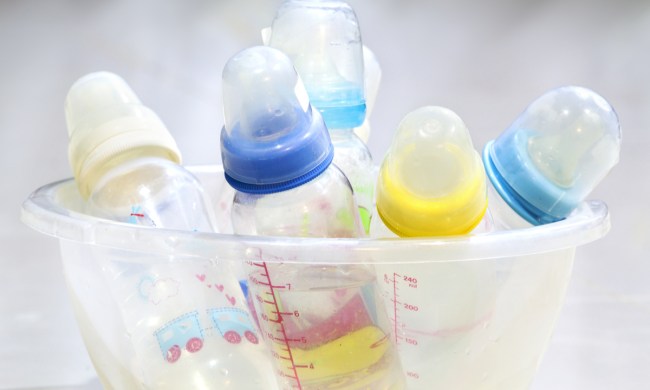Your baby’s “firsts” are both exciting and nerve-wracking. Are you introducing something too soon? Giving them too much of something? Not enough? That first year of your baby’s life has so many rules to remember. When it comes to their diet, the timeline of when you can introduce something at what age has a whole other set of guidelines. But what about good old H20? When can you give infants water? The answer to that is less abstract than you might think. When can babies have water? Read on.
You drink water all of the time. It’s the main fluid you drink to keep you going. You might think that means it’s harmless to give to your infant. But before you put any water in a cup, let’s go over the rules of when babies can have water.

Your baby doesn’t need extra water
If your baby is under a year old, they don’t need water. Water is used to make formula and is found in breast milk. They are getting plenty every day. Additional water isn’t necessary. Deborah Malkoff-Cohen, MS, RD, CDN, CDE, and a pediatric dietitian told Insider that “all hydration needs are met through breast milk/formula even in the hot and humidity of the summer.” The American Academy of Pediatrics says that water before 12 months is completely optional.
When not to give a baby water
Never give water to infants under 6 months of age
We are going to just get straight to the point with this one. Any baby under six months old should not be given water.
Why not
- Everything you give your baby should have a nutritional value
- A baby has a tiny tummy and kidneys
Your baby has an adorably little tummy. That means they cannot eat a lot at a time. If you fill your baby’s stomach up with water, there won’t be any room for breast milk or formula. That’s the only way your little one is getting the nutrients they need at that stage.
Their kidneys are too small to properly filter the water. They aren’t fully developed yet. The water can get filtered into the baby’s bloodstream. This flushes out too much salt out of the blood and can lead to a condition called hyponatremia. This is a life-threatening condition that can cause the brain to swell.
When you can give infants water
At 7 months it’s safe to introduce water – to a point
Once your bundle turns 7 months old, you can start to give them a little bit of water. You still want the primary source of their diet to be formula or breast milk and baby food.
Age and water ratio
- From 7 to nine 9 old, your baby can have up to four ounces of water a day
- From 9 to 12 months old, they can have up to eight ounces of water a day
Knowing the amount and age ratio of giving your baby water is handy.
How to introduce water
- Slowly and in lesser amounts
- Not in a bottle
Introduce it slowly and a little bit at a time. Start with two ounces at first. Water is a lot thinner than the breast milk or formula they are used to. Make sure you are there at first to help if any choking occurs as they learn how to drink water.
Skip putting it in a bottle. By the time your baby can have water you can start thinking about how to sneak that bottle away. Put it in their sippy cup or offer it in a cup with a straw.

A few myths
Water is fine if your baby is sick
No. Water is still not okay if your baby is sick. Your doctor might allow some Pedialyte depending on the baby’s age. But you still should not give water or juice if they are sick.
You can water down formula/breast milk to make it last longer
No. Please never water down your baby’s food. It can lead to a condition where your baby’s kidneys can’t keep up with the amount of water in their body. As long as your baby is gaining weight and hitting the proper milestones, they are getting enough to eat. There is no need to add additional water.
Bottled water is better than tap water
As long as your city water has the green light, tap water is fine. It has fluoride that your baby’s teeth need. Plus, bottled water can contain microplastics, so it isn’t always better.
Though water is harmless to you, it can be dangerous to tiny humans. Health issues can occur if you give water too early. Your baby will constantly change from birth to twelve months. For that first year, you’ll want to follow along with all of the ever-changing rules.
When it comes to water and your baby, skip it for at least the first six months. You shouldn’t think of it as one more thing you have to remember not to give them. You can think of it as one more thing you don’t have to worry about making sure they get.



